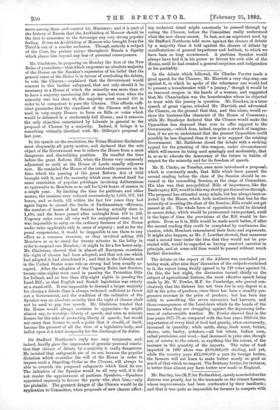The debate on the report of the Address was concluded
yes- terday week, after nine days' discussion of the subjects contained in it, the report being finally agreed to by 129 votes against 14. On this, the last night, the discussion turned chiefly on the subject of agricultural distress, the most effective speech being made by Mr. W. Fowler, M.P. for Cambridge, who proved con- clusively that the distress has not been due in any degree to a fall in the price of produce, since there has been a steadily pro- gressive increase in the price of produce; but has been due solely to something like seven successive bad harvests, and those consequences of the Land-laws which tie the hands of the farmers when -they are struggling against the depressing influ- ence of unfavourable weather. Mr. Fowler showed that in the four years 1875-79, as compared with the four years 1860-64, the importation of every kind of food had greatly, often enormously, increased in quantity; while cattle, sheep, fresh meat, butter, cheese, oats, barley, potatoes,—all but wheat, Indian corn, salted provisions, and wool,—had increased in price also, though not, of course, to the extent, or anything like the extent, of the increase in the quantity of the imports. The value of food imported in 1880 alone was £100,000,000 sterling, and yet, while the country pays £12,000,000 a year for foreign batter, the farmers will not learn to make butter nearly as good as much of that which we import. The Brittany batter, for instance, is better than almost any farm butter now made in England.


































 Previous page
Previous page